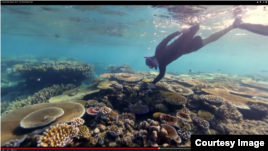26 October, 2014
The World Wildlife Fund says more than half of the world's wildlife population has been lost. The conservation group says this has placed the health of the planet at risk.
The WWF recently released its 10th Flagship Living Planet Report. The group warns the condition of the world's animals is worse than its earlier reports showed. It says worldwide action is needed.
The WWF says it is worried about the loss of and damage to Earth's environment. The report provides information about more than 10,000 animal populations from 1970 to 2010. These populations are called "vertebrate species," or animals with backbones -- like fish, birds, mammals, amphibians and reptiles.

A diver at the Great Barrier Reef. (Courtesy World Wildlife Fund)
The report says these populations have dropped by 52 percent in just 40 years. It says freshwater species have fallen by 76 percent. That is almost twice the loss of land and ocean species. Most of these losses are in the tropics. The report says the biggest drop has been in Latin America.
Marco Lambertini is the WWF's International Director-General. He spoke to VOA about the report.
"This is about losing natural habitats. This is about converting forests, grasslands, and wetlands into agriculture mainly, and it is about unsustainable use of wildlife. So, wildlife traffic, hunting, and unsustainable hunting practices like that. Poaching, as you mention, has been actually increasing over the last 10 years and is definitely a driving force for extinction, particularly of large species. But, also as you mention, there are dimensions to poaching that are related to timber, illegal logging and also fisheries."
The report also notes what it calls the world's "Ecological Footprint." That is the effect of human activities on the planet. Mr. Lambertini says there has been an increase in carbon dioxide gases and the pouring of nitrogen into oceans and rivers from fertilizers used in agriculture. He says this cannot continue.
"So, we are consuming on average every year about the equivalent of about 1.5, one-and-a half times the resources available to the planet. That means we are cutting trees more quickly than they can be restored. We are fishing the oceans more quickly than fishing stocks can reproduce, and we are emitting in the atmosphere more CO2 than the natural systems can actually absorb. This is clearly not sustainable."
Mr. Lambertini warns climate change affects almost everyone on the planet. He says whole species may disappear if the world does not reduce the effects of humans on the climate.
For VOA Learning English, I'm Anne Ball.
*This report was based on a story from reporter Lisa Schlein in Geneva. Christopher Cruise wrote the story for VOA Learning English. Caty Weaver was the editor.
______________________________________________________________
Words in This Story
conservation – n. the protection of animals, plants and natural resources
population – n. the number of people who live in a place
the tropics – n. the part of the world that is near the equator where the weather is very warm
habitat – n. the place or type of place where a plant or animal naturally or normally lives or grows
gas – n. a substance (such as oxygen or hydrogen) that is like air and has no fixed shape
reduce – v. to make (something) smaller in size, amount or number
Now it's your turn to use these Words in this Story. In the comments section, write a sentence using one of these words and we will provide feedback on your use of vocabulary and grammar.